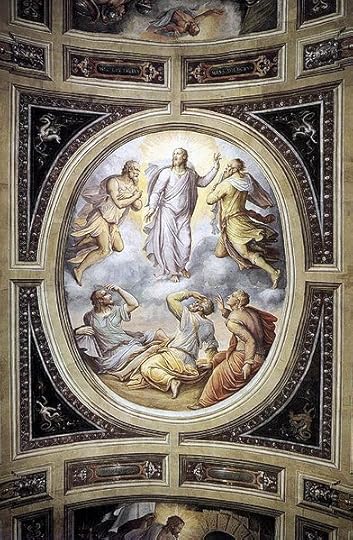The Transfiguration teaches us detachment

The Transfiguration by Gherardi (Wikimedia Commons). What must you let go of to grow closer to Christ?
Last week’s Gospel was about the Transfiguration of Jesus. As you recall, Jesus took Peter, James, and John up Mt. Tabor. Moses and Elijah appeared and spoke with Him about His coming Passion. Hearing the Gospel, I was struck by what it teaches us about detachment in the spiritual life.
Moses represents the Law. Elijah represents the Prophets. The Law and the Prophets together form the basis of the Old Testament.
From the good to the perfectWhen Peter saw Moses and Elijah, he said, “Lord, it is good for us to be here.” He suggested building booths or tents in which the three religious figures could stay. No doubt he wanted to speak with Moses and Elijah and hear their wisdom in person.
But this was not God’s plan. God the Father spoke to the Apostles from the cloud. Then they looked up and saw Jesus standing before them alone.
The Law and the Prophets prepared the way for Jesus. But now that Jesus had come, they had to give way. They were good, but the Gospel is better. Moses and Elijah served their purpose in pointing towards Jesus. As St. Paul said, “When the perfect comes, the imperfect passes away” (1 Corinthians 13:10).
Letting go of the merely good in our livesLike the Apostles, we need to leave behind all that is “merely good’ in order to be perfectly conformed to Christ. We cannot cling to anything or anyone but Him.
Children–and beginners in the spiritual life–have different needs than adults. Infants need milk. Adults need solid food. God weans us from the practices that nourished us in the beginning so that we can be spiritually mature.
Moving beyond the LawAs we grow, we need to let go of these things that metaphorically relate to the Law:
counting our meritscomparing ourselves with othersknowledgemeditation on Sacred ScriptureNow, obviously, we cannot give up knowledge in the sense of becoming ignorant again. We can’t start ignoring Church teaching. But we can come to recognize that God is immeasurably greater than all human knowledge. We can stop nitpicking, stop judging. We can move from a spirituality based on knowledge to one based on love.
And so with the other items in the list. We give up meditation for contemplation. We give up comparisons that in the beginning may have inspired us toward holiness, but now foster pride. We stop weighing our sins against our merits, realizing that the scale will never be balanced.
Moving beyond the ProphetsWe need to let go of these things that metaphorically recall the Prophets:
visions, dreams, and prophesiesmiraculous signsspiritual consolationsecstasies and rapturesAs good as these things are in the proper place and time, they are not the goal. There are merely means to the end, which is union with Jesus. We cannot take any of these things to Heaven. If we cling to them, God will have to pry them from us in Purgatory.
St. Paul says, “Therefore the law was our disciplinarian until Christ came, so that we might be justified by faith” (Galatians 3:24). Adults should not need a disciplinarian! Instead of mere teachers, we have a Bridegroom. We must “throw off everything that hinders us” from marriage to Him (Hebrews 12:1).
Let this Lent be a time for letting go!
Connie Rossini
Share with us: What are you most struggling to let go of? How can you begin to let go?
Other posts you may likeContemplative Homeschool.


